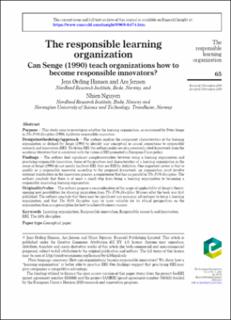| dc.contributor.author | Hansen, Jens Ørding | |
| dc.contributor.author | Jensen, Are | |
| dc.contributor.author | Nguyen, Nhien | |
| dc.date.accessioned | 2020-06-10T10:16:14Z | |
| dc.date.available | 2020-06-10T10:16:14Z | |
| dc.date.created | 2020-06-08T22:43:49Z | |
| dc.date.issued | 2020 | |
| dc.identifier.citation | Learning Organization. 2020, 27 (1), 65-74. | en_US |
| dc.identifier.issn | 0969-6474 | |
| dc.identifier.uri | https://hdl.handle.net/11250/2657508 | |
| dc.description.abstract | Purpose
This study aims to investigate whether the learning organization, as envisioned by Peter Senge in The Fifth Discipline (1990), facilitates responsible innovation.
Design/methodology/approach
The authors analyze the component characteristics of the learning organization as defined by Senge (1990) to identify any conceptual or causal connections to responsible research and innovation (RRI). To define RRI, the authors make use of a commonly cited framework from the academic literature that is consistent with the vision of RRI promoted in European Union policy.
Findings
The authors find significant complementarities between being a learning organization and practicing responsible innovation. Some of the practices and characteristics of a learning organization in the sense of Senge (1990) do not merely facilitate RRI, they are RRI by definition. One important caveat is that to qualify as a responsible innovator according to the proposed framework, an organization must involve external stakeholders in the innovation process, a requirement that has no parallel in The Fifth Discipline. The authors conclude that there is at most a small step from being a learning organization to becoming a responsibly innovating learning organization.
Originality/value
The authors propose a reconsideration of the scope of applicability of Senge’s theory, opening new possibilities for drawing inspiration from The Fifth Discipline 30 years after the book was first published. The authors conclude that there may be significant non-economic advantages to being a learning organization, and that The Fifth Discipline may be more valuable for its ethical perspectives on the organization than as a prescription for how to achieve business. | en_US |
| dc.language.iso | eng | en_US |
| dc.publisher | Emerald Publishing Limited | en_US |
| dc.rights | Navngivelse 4.0 Internasjonal | * |
| dc.rights.uri | http://creativecommons.org/licenses/by/4.0/deed.no | * |
| dc.title | The responsible learning organization : Can Senge (1990) teach organizations how to become responsible innovators? | en_US |
| dc.type | Peer reviewed | en_US |
| dc.type | Journal article | en_US |
| dc.description.version | publishedVersion | en_US |
| dc.source.pagenumber | 65-74 | en_US |
| dc.source.volume | 27 | en_US |
| dc.source.journal | Learning Organization | en_US |
| dc.source.issue | 1 | en_US |
| dc.identifier.doi | 10.1108/TLO-11-2019-0164 | |
| dc.identifier.cristin | 1814450 | |
| dc.relation.project | EC/H2020/788361 | en_US |
| dc.relation.project | EC/H2020/824588 | en_US |
| dc.description.localcode | Copyright © 2020, Jens Ørding Hansen, Are Jensen and Nhien Nguyen. Emerald Publishing Limited. This article is published under the Creative Commons Attribution (CC BY 4.0) licence. Anyone may reproduce, distribute, translate and create derivative works of this article (for both commercial and non-commercial purposes), subject to full attribution to the original publication and authors. The full terms of this licence may be seen at http://creativecommons.org/licences/by/4.0/legalcode | en_US |
| cristin.ispublished | true | |
| cristin.fulltext | original | |
| cristin.qualitycode | 1 | |

